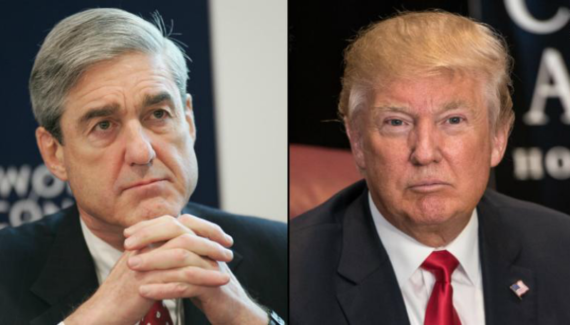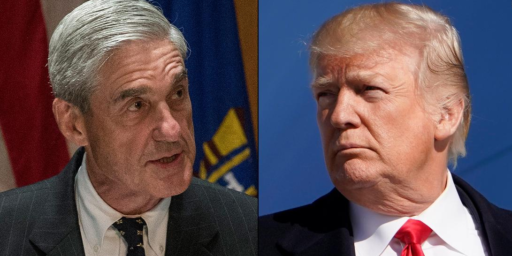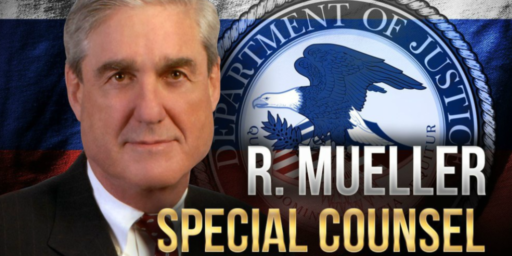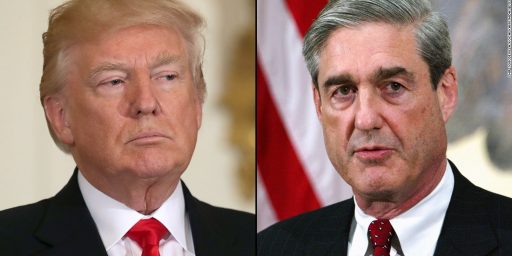Mueller Has Donald Trump In An Impossible Situation, And A Potential Perjury Trap
When it comes to a potential interview with Robert Mueller, President Trump faces risks no matter what form that interview takes.

As I noted yesterday, The New York Times got its hands on what appears to be a list of the potential questions that Special Counsel Robert Mueller would like to ask President Trump in the event that he agrees to an interview. Today Times reporter Charlie Savage notes that, based on these questions, agreeing to an interview would be a minefield for Trump:
WASHINGTON — President Trump has insisted he is eager to make the case to the special counsel, Robert S. Mueller III, that he has done nothing wrong. But the questions that Mr. Mueller wants to ask show why the president’s lawyers have countered that an interview would be a minefield for Mr. Trump.
It is not just that the president has a history of telling demonstrable falsehoods, while the special counsel has already won four guilty pleas for the crime of lying to investigators. The questions would pose additional challenges for Mr. Trump, legal experts said.
Many of Mr. Mueller’s questions, obtained and published by The New York Times, are so broad that Mr. Trump would need a detailed command of a range of issues. And, complicating efforts to try to adequately prepare him for such an encounter, the president’s lawyers do not know everything that the special counsel has learned.
“This list reinforces the notion that the president should not go in for an interview with Mueller,” said Sol Wisenberg, a white-collar defense lawyer who was a deputy independent counsel in the Whitewater investigation. “Mueller knows all kinds of things — we don’t know exactly what he knows — and these are both broad and detailed questions, making real land mines.”
On Tuesday, Mr. Trump denounced the publication of the questions in a pair of Twitter posts. He called it “disgraceful” and again pronounced Mr. Mueller’s investigation a “witch hunt.” He also incorrectly declared both that none of the questions were about “collusion” — in fact, many centered on his campaign’s ties to Russia — and that it would be “hard to obstruct justice for a crime that never happened.” (Efforts to obstruct an investigation can be prosecuted even if no underlying crime is found.)
(…)
One major threat to Mr. Trump posed by such open-ended questions is that, as his Twitter diatribe showed, he has a history of saying things that are not true — especially when he rambles off the cuff. It is a felony to lie to law enforcement officials or to conceal a material fact during a proceeding like a formal interview.
Moreover, the list of questions is most likely a starting point for follow-ups as investigators try to iron out ambiguities. Paul Rosenzweig, another former Whitewater prosecutor and a senior fellow at the R Street Institute, a conservative and libertarian research organization, said they could be seeking such details as: What was the source of your knowledge? When did you find out? Who told you and what exactly did they say?
“You don’t just ask, ‘What did you know about the Trump Tower meeting?’ and he tells you the answer,” Mr. Rosenzweig said. “With 48 questions like that, that’s honestly a two-day interview. That’s 12 hours of questioning.”
And in part because former Trump associates who have pleaded guilty are cooperating with the inquiry, the White House does not know what evidence the special counsel has obtained that could contradict Mr. Trump, Mr. Wisenberg said. Because of that, he said, the president’s lawyers were in a worse position to prepare their client for an interview than President Bill Clinton’s team was in the Whitewater investigation.
“It’s totally different than when President Clinton came into the grand jury room to talk to us,” he said. “He pretty much knew everything we knew. It was far less risky.”
Even so, Mr. Clinton perjured himself by falsely denying that he had had a sexual affair with Monica Lewinsky. That became part of the referral to Congress by Kenneth W. Starr, the independent counsel, that led to Mr. Clinton’s impeachment.
As part of those proceedings, the videotape of Mr. Clinton’s false testimony became public, taking its place in his legacy. It is far from clear, however, that any transcript or recording of Mr. Trump’s interview — if he gives one — would similarly become public. Mr. Rosenzweig said the interview would be covered by investigative secrecy rules, and there was no clear mechanism for it to be disclosed under Mr. Mueller, who has less power than Mr. Starr enjoyed.
Mr. Mueller’s authorities remain uncertain; it is not clear that he could charge Mr. Trump with a crime or send an impeachment referral report directly to Congress. That has left his potential endgame unclear if he does conclude the president committed some kind of wrongdoing.
But the list of questions indicates that the investigation remains a significant threat to Mr. Trump even if he were to be honest about everything in any interview.
The biggest liability that Trump faces in a potential interview with Mueller, of course, is the fact that he’s Donald Trump. As we’ve seen since he became a candidate for President, and indeed long before then, Trump has a long-standing tendency to speak off the top of his head and to ramble on in response to questions in a manner that should worry his attorneys and advisers regarding the wisdom of agreeing to any kind of interview with Mueller and his team. That tendency is largely what drives his Twitter habit, and can also be seen in everything from the largely extemporaneous speeches he gives at the campaign-style rallies he continues to enjoy holding and in the interviews he grants to the news media, such as the extended phone interview he took part in on Fox And Friends just last week. Questioning a potential target like that is something that prosecutors and investigators long for, because people who speak in this manner tend to provide far more information than they need to in response to investigators and because it often leads to situations where they end up either contradicting things they’ve said in the past or evidence that the investigators have access to that the witness doesn’t know about. That, of course, leaves the person being questioned in danger of being charged with lying to a Federal official, which is a felony.
This is the main reason why Trump’s legal team is likely working behind the scenes to limit both the scope and the length of any questioning that they might agree to, and why Mueller is likely pushing back to make both the scope and length as long as possible in order to cover all the subject areas he’s interested in covering. Some observers have suggested that Trump may decide not to cooperate at all, or to propose the alternative of providing written answers to written questions. Mueller would likely object to the second option since it would preclude the possibility of follow-up questions, or of assessing the potential effectiveness of Trump as a witness in a future proceeding. The final option, of course, would be that Trump’s team could decide not to cooperate at all, but as Mueller himself apparently reminded them recently, that leaves open the possibility of a subpoena that would require Trump to testify before one of the two Grand Juries that Mueller has convened in this matter:
In a tense meeting in early March with special counsel Robert S. Mueller III, President Trump’s lawyers insisted he had no obligation to talk with federal investigators probing Russia’s interference in the 2016 presidential campaign.
But Mueller responded that he had another option if Trump declined: He could issue a subpoena for the president to appear before a grand jury, according to four people familiar with the encounter.
Mueller’s warning — the first time he is known to have mentioned a possible subpoena to Trump’s legal team — spurred a sharp retort from John Dowd, then the president’s lead lawyer.
“This isn’t some game,” Dowd said, according to two people with knowledge of his comments. “You are screwing with the work of the president of the United States.”
The flare-up set in motion weeks of turmoil among Trump’s attorneys as they debated how to deal with the special counsel’s request for an interview, a dispute that ultimately led to Dowd’s resignation.
In the wake of the testy March 5 meeting, Mueller’s team agreed to provide the president’s lawyers with more specific information about the subjects that prosecutors wished to discuss with the president. With those details in hand, Trump lawyer Jay Sekulow compiled a list of 49 questions that the team believed the president would be asked, according to three of the four people, who spoke on the condition of anonymity because they were not authorized to talk publicly. The New York Times first reported the existence of the list.
The biggest disadvantage of a subpoena over a voluntary interview is the fact that, in the former case the witness in question would be subpoenaed to appear before a Grand Jury. In that situation, they would not be in the Grand Jury room alone with the presiding prosecutors and the members of the Grand Jury. The witnesses attorneys would not be allowed in the room, they could not prevent the prosecutor from asking questions via an objection or another legal maneuver, and they would not be able to halt their client from rambling on in response to questions in a manner that could end up incriminating them or leading them to provide false or misleading responses to question. For someone like Trump, this is clearly a more dangerous situation than an interview with Mueller and his investigators at which his attorneys would be present to assist him. As such, it’s a situation that Trump’s attorneys would most likely want to avoid.
The biggest question from a legal point of view that a subpoena would raise, of course, is whether or not a sitting President can be subpoenaed to testify. Originally, Whitewater prosecutor Ken Starr had subpoenaed President Bill Clinton to testify before the Grand Jury he had convened, but he agreed to withdraw the subpoena after Clinton agreed to appear voluntarily. Therefore, the legal question of whether or not Clinton could be subpoenaed was never ruled on by a Court. While this would be a case of first impression, though, it seems clear that the best authority is on the side of the idea that a President can be subpoenaed.
The most favorable precedent from Mueller’s point of view, of course, would be United States v. Nixon, which dealt with the efforts of Watergate Special Prosecutor Leon Jaworski to subpoena the tape recordings that Nixon had made of conversations in the Oval Office that included conversations he had with top aides regarding the Administration’s response to the Watergate break-in. Jaworski had subpoenaed these tapes shortly after John Dean confirmed to the Watergate committee that there was a recording system in the Oval Office. Initially, the Nixon Administration resisted the subpoena, citing executive privilege among other grounds for withholding the requested tapes. In an expedited ruling, the Supreme Court ruled unanimously, with Justice Rehnquist recusing himself due to his previous position in the Justice Department, that Nixon must turn over the tapes. This, of course, led to the revelation of conversations so incriminating that they made Nixon’s impeachment and removal from office a virtual inevitability. Instead of facing that fate, Nixon resigned.
Given the Nixon precedent, it seems fairly clear to me at least that Trump would be on the losing side of a legal fight over the validity of any potential subpoena. If Oval Office tapes can be subpoenaed then there doesn’t seem to be any reason why the President himself can be subpoenaed to testify as a witness. Of course, if the Russia investigation heads down this path it would like mean months of litigation in the Federal Courts and, ultimately a decision by the Supreme Court. While anything is possible and the makeup of the Court has changed significantly from what it was in 1974 I don’t think that even this court would be willing to ignore the Nixon precedent. For that reason alone, I suspect that eventually, Trump will agree to some kind of interview with Mueller at which his lawyers can be present, but it’s likely to take both sides some time to come to terms on what kind of interview that’s going to be.





Trump just lost another lawyer, Cobb, to retirement. To be replaced by Emmet Flood, Bill Clinton’s impeachment lawyer.
Just fire everyone in the Dept of Justice and FBI, problem solved. #MA-GAing
@Mu:
Lol, is retirement how they’re trying to spin it?
He quit …
The choice of Emmet says a great deal about where the White House expects this fiasco to eventually go. They’re stacking sandbags.
@Mu: Whoa, a for real serious lawyer? Trump must be getting desperate enough to pay up front.
Perjury Trap is such a pejorative term. All he has to do to avoid perjury is tell the truth, or plead the fifth.
It’s like calling a gun a Murder Trap. You need to exercise some care with it, but it’s up to you whether you murder someone.
Breaking…Ty Cobb is leaving Dennison’s legal team. Dennison plans to hire Emmett Flood.
Cobb famously told Dennison the investigation would be over by Thanksgiving. Flood worked for Clinton during that impeachment.
I think we can all agree that Mueller is a serious man.
It seems illogical to me that he would be this aggressive if he doesn’t have anything.
Subpoenaing a President is obviously a big deal…but so is getting a warrant to raid an attorneys office; not sure why you’d go down those roads if you didn’t think there was any there, there.
Everything Trump Touches Dies: RIP Ty Cobb. You had a career, you had a reputation, and now you’ve got nothing but Trump’s grubby paw prints on you.
There is simply no way Trump can answer questions either in an interview or before the Grand Jury without either confessing to felonies or committing perjury. The angry white guy act isn’t going to work on Mueller or the Grand Jury.
Yeah, he might miss out on golfing time, and then he gets so cranky even a mound of cheeseburgers and a marathon session of Fox & Friends fail to cheer him up.
All jokes aside, though, a lawyer owes their client a zealous defense, not a defense by any means necessary. So we won’t see extraordinary measures like having Trump’s lips sewn shut.
Meanwhile, idiot Pruitt went on at least two official foreign trips partially organized by, and partially funded by, lobbyists working for the foreign governments he was visiting.
Lobbyists who accompanied him on the travel.
This really is Stupid Watergate …
An interview is more favorable to Trump than subpoenaed testimony before a grand jury, for all the reasons Doug lists. So any Trump lawyer arguing against an interview is saying they’ll fight a subpoena. Or worse, that Trump will simply not honor a subpoena. If Trump ignored a subpoena it wouldn’t seem possible to jail him for contempt. Can a lawyer so advising him be jailed?
@gVOR08:
If it went that far, can the Secret Service just allow him to be taken to a jail, without making sure first he’d be safe from potential threats, food poisonings, etc? Wouldn’t a protective detail be stationed in his cell?
I’d pay money to see that.
We’re getting Trump placed in an impossible position for free, after all.
As a side note, you have reminded me of the 18-and-a-half minute gap in one of the recordings, which was “accidentally” erased by Rosemary Woods, Nixon’s personal secretary.
Given that the tapes were incriminating, I still wonder what was in those 18 minutes that was so terrible that they decided to erase it. And no, I don’t think it was an accident.
“The interview the cops want to do with me is a Bank Robbery Trap, says guy definitely not guilty of bank robbery.”
@gVOR08: Welcome to the constitutional crisis portion of these events. I think we are on the brink.
Did Trump Bribe Ukraine to Stop Cooperating With Mueller?
By
Jonathan Chait
@Jay L Gischer:..And no, I don’t think it was an accident.
But…but…I don’t know what happened to the other 13 minutes…you gotta’ believe me!
And now MSNBC is reporting that Emmett Flood isn’t even replacing Ty Cobb. He’s replacing White House Counsel Don McGahn.
The people out here that I am hearing don’t keep up with this stuff. A lot of of people feel that this all being done by Hillary to get back for losing.
“Who’s Comey?”
“It’s all for nothing, all for nothing”
@Tyrell:
Wow. You know it’s serious when the only defense his supporters can muster is “nobody’s heard about it yet.”
Well, we are talking about someone who will very likely shot his own foot with that gun…
@Neil Hudelson:
That doesn’t make any sense, to be honest. The WHC represents the office of the presidency, not the sitting president as an individual. Installing Emmet as WHC would preclude his being able to directly represent the president in this matter.
It does make sense, however, if one views it as “Trump wants to sideline the taxpayers into funding his defense by installing someone who would be working on matters he shouldn’t be working on”. The graft knows no bounds …
Squirrel!
@Gustopher:
Perjury Trap is a technical term that is being deliberately misused by Trump’s allies. A true Perjury Trap is interrogating someone without any desire to obtain information or evidence, with no motive other than to catch the subject in a lie. Perjury Trap is considered unethical and grounds for disciplining the interrogator.
Interviewing Trump can not be a Perjury Trap because what Trump knew and Trump’s state of mind and additional evidence that could be obtained are all legitimate areas of inquiry that would be in play. If Trump is put at risk of perjury, tough sh!t.
It’s regrettable that Trump’s enablers have so normalized the misuse of this term “Perjury Trap” that we see it so much and so inappropriatly.
@Charon:
Agreed. I’ll go one further and rant (again) about the misuse of “collusion”, which has an extremely limited definition with respect to federal law.
The phrase that should be in use is “conspiracy to violate federal law(s) in order to improperly influence an election”.
@HarvardLaw92:
Misuse of language is rampant. “Fake News” is another example of a perfectly good term that has been stripped of its real (original) meaning.